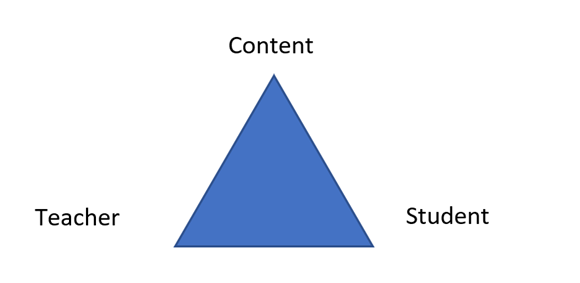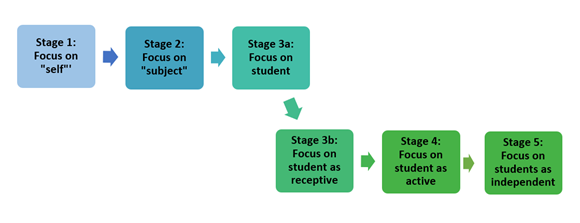
THEME: PhD students’ pedagogical competence development - The challenges
The challenges that the Ph.d.-students describe, first and foremost bear witness to that they relate to and are interested in their teaching assignments. Their challenges span a wide field and reflect the PhD students’ level of experience, their personalities and their different approaches to teaching and the role of the lecturer.
Some PhD students see it as their biggest challenges that when graduating, they go from being a student to being the lecturer in the room. The shift is both subject-related – how to handle the subject matter as an expert, and in taking responsibility for scaffolding the students’ learning. To feel responsible for and defining the level of responsibility for the students’ learning is an often-heard challenge.
From a general perspective, the PhD students’ challenges can be illustrated by the didactic triangle below (Fig. 1). The triangle refers to challenges in relation to their role as lecturers, the content matter, and the role of the students.

Many challenges revolve around the handling of the subject matter, for instance the structure of a lecture, the size of the syllabus, how to feel well prepared, worries about being able to answer all questions from the students, or, in general, how to determine the right academic level. Some describe the challenge of taking over a course from a more experienced colleague, and the clear difference in the ability to handle the subject matter. The planning and structuring of the course are recurrent themes, and especially being able to cope with a large curriculum is a crucial matter. Major focus is on the relation between being the lecturer and being able to handle the subject matter.
The relation to the students and the students’ needs in relation to learning is another recurrent theme. The PhD students are aware that the students have different ways of learning, but it is a challenge to take these differences into account in their own planning. This is connected to the PhD students’ wish to motivate the students. They take note of when students do not participate during lessons or do not attend lessons, and this challenge raises questions about, how best to motivate the students. Implicit in the descriptions is a concern about how to align expectations.
The PhD students are aware that the students are a diverse group, including students’ academic level. Many find it difficult to establish working methods that at the same challenge the able students and respect the group with more difficulties. They pay attention to the students but find it a major challenge to handle their differences.
Many participants have their primary focus on their role as a lecturer, but the relation between the students and content is also brought into focus. In this case, the challenges often concern the students’ active participation. The focus is on the importance of creating learning activities, but there is uncertainty about which activities and how to best organize them.
This short summary of the PhD students’ pedagogical challenges gives us an insight into their professional development as teachers. It is a matter of experience, but it is especially about how the PhD students are supported in developing their pedagogical competences. Their different challenges reflect in many ways Peter Kugel’s (1993) model, that describes the development of a teacher (fig. 2).

Fig. 2. Kugel’s five stages (1993)
The first step into teaching is almost inevitably a focus on ‘me’ as a lecturer. The questions are many: Will I make it, will I manage to say all I need, what if the students ask questions in a subject matter I do not know anything about, can they tell that I am nervous, do I speak too fast?
From ‘me’ the focus shifts to the subject that is to be taught. At this stage the professor is primarily concerned with getting acquainted with the subject and organizing it, so that he himself can present it. His main focus will be on whether he has the time to communicate all that is important.
With a greater proficiency as a lecturer and more familiarity with the subject, it is easier to focus on the student as a participant. They are no longer just ‘them’ and ‘recipients’, but they are seen as co-players and mainly responsible for their own learning. This is not an entirely linear progression, but the model provides a framework for understanding the s the challenges new professors are facing, and about the many potentials for development.
The pedagogical challenges are obviously many and differentiated. Experience is key, but as a place of employment SDU has an obligation to create opportunities to develop pedagogical competences. Courses, feedback and mentor relations are examples of opportunities for competence development. The course ‘Getting started on your teaching’ (pdf), offered by SDUUP, contributes to the PhD students’ pedagogical competence development, but what the participants learn unfolds in their daily practice, where they have the opportunity to test and reflect over their pedagogical practice.
Registration for the PhD course 'Getting started on your teaching'